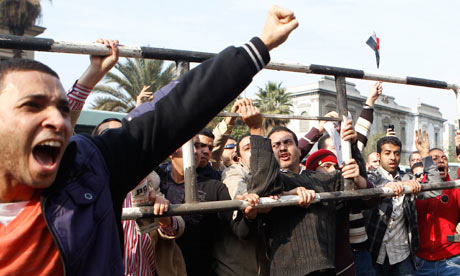CHAOS IN CAIRO
The city of Cairo in the land of Pharaoh is in utter chaos. Uncontrollable protests against the government of Egyptian President and U.S. ally Hosni Mubarak have reached the point of no return with no amicable end in sight.
Egyptians woke up yesterday to the scene of several key buildings destroyed by fire and still smoldering in ruins, while thousands of protesters camped out in the city’s main square in defiance of an extended nighttime curfew. Hoping a total firing of his entire cabinet would silence the protesters, President Mubarak continued to cling to power with promises of reform and a new government. Over the weekend he named his intelligence chief as the nation’s first-ever vice president, in an attempt to set-up a successor in case of his demise. The sad state of affairs in Egypt was further agitated when military soldiers stood by amidst the chaos, some even joining the demonstrators, as the death toll from the 5 days of fury rose to 74.
 On Saturday night, the police gave up and disappeared, prompting local residents to set up makeshift checkpoints and barricades around their neighborhoods, armed mostly with clubs and sticks intent on protecting their homes. Residents and shopkeepers in affluent neighborhoods boarded up their houses and stores against looters, who terrorized the streets with knives and sticks, stealing what they could while destroying cars, windows and street signs in the process. By morning, armored military vehicles were seen protecting main government buildings, including the Egyptian Museum, home to some of the country’s most treasured antiquities, and the Cabinet building. The military closed the pyramids on the outskirts of Cairo as a precaution, but residents were left to fend for themselves.
On Saturday night, the police gave up and disappeared, prompting local residents to set up makeshift checkpoints and barricades around their neighborhoods, armed mostly with clubs and sticks intent on protecting their homes. Residents and shopkeepers in affluent neighborhoods boarded up their houses and stores against looters, who terrorized the streets with knives and sticks, stealing what they could while destroying cars, windows and street signs in the process. By morning, armored military vehicles were seen protecting main government buildings, including the Egyptian Museum, home to some of the country’s most treasured antiquities, and the Cabinet building. The military closed the pyramids on the outskirts of Cairo as a precaution, but residents were left to fend for themselves.
 Protesters say they are united in one non-negotiable demand — that President Mubarak and his family must go. Their collective anger is a culmination of years of frustration over a government they see as corrupt, heavy-handed and neglectful of poverty. As 43-year-old teacher Rafaat Mubarak put it, the appointment of the president’s intelligence chief and longtime confidant, Omar Suleiman, as vice-president did not satisfy the protesters. “This is all nonsense. They will not fool us anymore. We want the head of the snake,” he said. “If he is appointed by Mubarak, then he is just one more member of the gang. We are not speaking about a branch in a tree, we are talking about the roots.”
Protesters say they are united in one non-negotiable demand — that President Mubarak and his family must go. Their collective anger is a culmination of years of frustration over a government they see as corrupt, heavy-handed and neglectful of poverty. As 43-year-old teacher Rafaat Mubarak put it, the appointment of the president’s intelligence chief and longtime confidant, Omar Suleiman, as vice-president did not satisfy the protesters. “This is all nonsense. They will not fool us anymore. We want the head of the snake,” he said. “If he is appointed by Mubarak, then he is just one more member of the gang. We are not speaking about a branch in a tree, we are talking about the roots.”
The crackdown on protesters has drawn strong criticism from the Obama administration, with pleas for the government to stop the violence and blood shed. The administration even issued a threat Friday that they may reduce a $1.5 billion foreign aid program if their most important Arab ally escalates the use of force. But it’s a delicate dance for President Obama, since Egypt has long served as a buffer between the U.S. and islamic extremists. It is a necessary relationship the U.S. would certainly like to continue, yet they can not stand idly by and watch the violence without condemnation.
The story continues.






